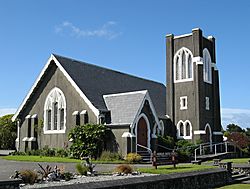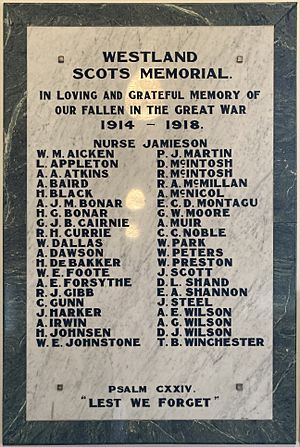St Andrew's United Church facts for kids
Quick facts for kids St Andrew's United Church |
|
|---|---|

St Andrew's United Church, Hokitika
|
|
| 42°42′55.6″S 170°58′7.3″E / 42.715444°S 170.968694°E | |
| Location | 66 Hampden Street and Fitzherbert Street, Hokitika |
| Country | New Zealand |
| Denomination | Presbyterian/Methodist |
| History | |
| Status | Parish church |
| Architecture | |
| Functional status | Active |
| Heritage designation | Category I |
| Designated | 28 June 1990 |
| Architect(s) | Roy Lovell-Smith |
| Architectural type | Gothic |
| Groundbreaking | 19 July 1919 |
| Completed | 24 November 1935 |
| Construction cost | £2,540 |
| Specifications | |
| Materials | Reinforced concrete, roughcast plaster |
St Andrew's United Church is a special building in Hokitika, New Zealand. It used to be called the Scot's Memorial Church. This church brings together two Christian groups: Presbyterians and Methodists. It is a very important historical building on the West Coast of New Zealand. It has a "Category I" heritage listing, which means it's highly valued.
Contents
The Church's History
The very first St Andrew's Church in Hokitika was built a long time ago, in February 1867. This happened after the first minister, Reverend John Gow, arrived in the area. It was a wooden building with a tall, pointy spire. This original church was located on Stafford Street.
A New Church Idea
In 1919, the church members decided to build a brand new church. They wanted to call it the Scot's Memorial Church. This new building would honor the brave Westland Scots who died in the First World War. It was also meant to be a thank you to God for the Allied victory in the war.
A special ceremony to start the building was held on Peace Day in 1919. However, the church was eventually built in a different spot than first planned.
Building Delays and Completion
It took a while to get started on the new church. An architect, Roy Lovell-Smith, wasn't hired until 1931 to design it. Building was then delayed because of problems choosing the right location and also money issues.
Finally, in January 1935, builders were asked to submit their prices. A month later, a company from Christchurch, J.O. Grant, was chosen. Their price was £2,450. The church officially opened on November 24, 1935. The total cost ended up being a little over £2,540.
The original church building from 1867 was then used as a Sunday school. It stayed that way until it was taken down in 1946. In 1941, a small book was published to celebrate the church's 75th birthday.
In 1970, the Presbyterian St Andrew's Church joined with the Methodist church. This created the St Andrew's United Parish, bringing the two groups together.
How the Church Was Built
The church is built in a style called Gothic. This means it has pointed arches and tall windows, but not too many fancy decorations inside. The church tower is special because it has wide Gothic arch windows on all four sides.
The church is made of strong reinforced concrete. It has double walls and a rough, textured plaster on the outside. The roof is made of slate, and the wooden parts along the roof edges are called bargeboards. Inside, the walls are smooth plaster. The ceiling and all the wooden fittings were designed by the architect and are made of oiled rimu wood.
Inside the church, you can find the Westland Scots Memorial. This is a marble plaque that lists the names of forty local people from Westland who died in the First World War. It's a very important part of the church's history.
What is its Status Today?
St Andrew's United Church is officially recognized by Heritage New Zealand. It is listed as a Category I building, with the number 5013. This listing shows how important St Andrew's is. It was the first Presbyterian church group to be set up on the West Coast. The church building itself is a clear sign of this history and also a memorial to those who served.
The listing also says the building is a great example of a small Gothic-style church. It is an important local landmark. The Roll of Honour inside the church, which lists the names of the fallen, is described as "very fine."
 | Laphonza Butler |
 | Daisy Bates |
 | Elizabeth Piper Ensley |


